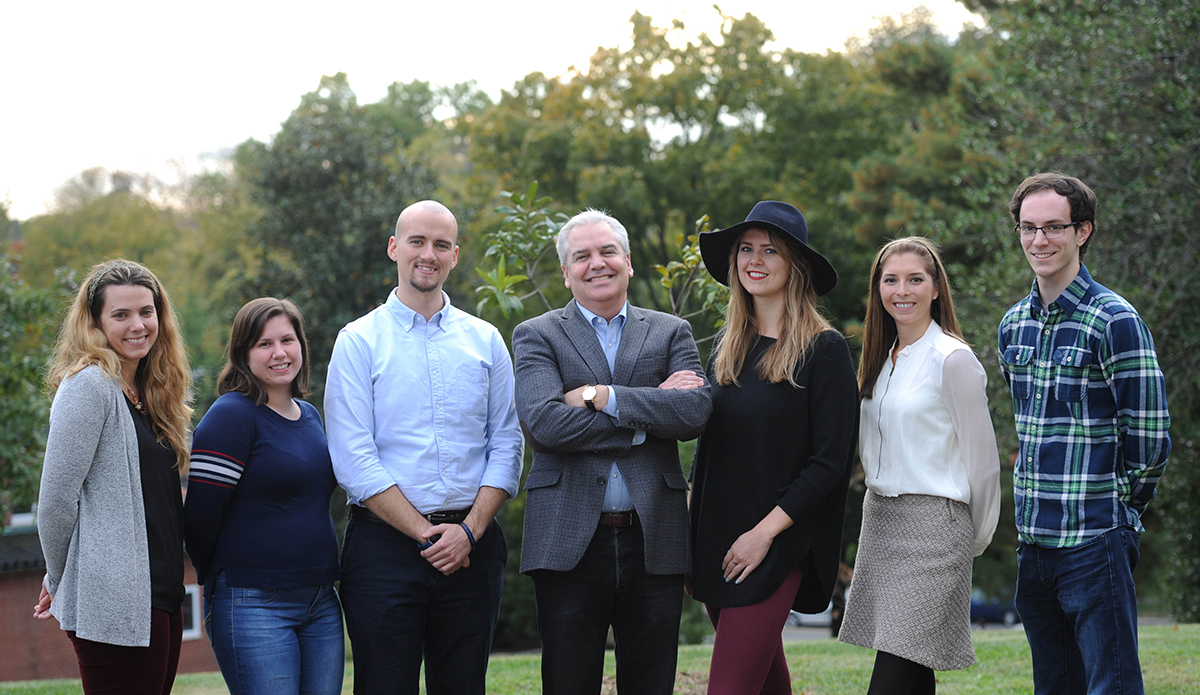

In Room G-4 of O’Boyle Hall, there is a sense of hope. Home to the Suicide Prevention Lab, the students who work there believe the research they are doing will help save lives.
Overseen by Professor of Psychology David Jobes, the lab focuses on suicide risk assessment in various populations, such as military veterans or young people. The approximately 30 doctoral, master’s, and undergraduate students in the lab analyze clinical trial data on the effectiveness of the Collaborative Assessment and Management of Suicidality (CAMS). Developed by Jobes, CAMS is an innovative and flexible therapeutic approach to treating suicidal risk.
“The idea is that it’s collaborative. CAMS is geared toward empowering the patient in how they’re going to manage their suicidality,” explains Paul El-Meouchy, a second-year master’s student. “The patient works with the clinician to manage the [suicidal thoughts] and plans what they can do to improve their lives. I think when we feel empowered and we have control of our fate, we tend to strive better. We put our own skin in the game. That’s really the basis of CAMS.”
Clinical trials of CAMS are being held around the world. Students in the lab use data from the trials to look at various research questions, such as how clinicians in various countries adapt the model to their patients or how college students react to the model. Studying patient responses and plans can be emotional, but students in the lab say they feel optimistic about what they see.
“I’ve never seen someone get worse,” says Madi Bell, a junior psychology major. “It’s really uplifting to watch someone’s progress on a weekly basis and it gives you a lot of hope.”
Bell lost a friend to suicide when she was in high school. She says the most rewarding part of the lab experience is “getting to go home and tell my friend’s parents about what I am doing. That really means a lot to them.”
Allie Bond, a senior psychology major, says that although the students never meet the people involved in the clinical trials, they develop compassion for them.
“You see them get better and you’re reminded that this is a real person. Someone is actually benefitting from the things we’re doing in the lab.”
The collaborative approach of CAMS has trickled down to the lab community. Students are grouped together as part of a buddy system based on interests as well as strengths and weaknesses. The groups are comprised of a mix of undergraduate, master’s, and doctoral students. The students may turn to each other for advice on anything from coding data to applying to jobs or graduate programs.
Jobes, who has won the Faculty Achievement Award for Research from Catholic University and the Marsha Linehan Award for suicide treatment research from the American Association of Suicidology, is a constant presence in the lab. As an internationally recognized suicidologist, he has a professional network that he makes available to his students.
Brian Piehl is one of two second-year doctoral students who run the day-to-day operations of the lab. He has an interest in the Perspective Taking Task, a tool used with CAMS that encourages patients to take the perspective of their loved ones when considering suicide. Soon after Piehl arrived at Catholic University, Jobes connected him with Eoin Galavan, the creator of the Perspective Taking Task.
“I had been [at Catholic University] three or four weeks and I was already working with someone in Ireland. That just blew my mind. When I've Skyped and talked with him, I've seen how his personality and therapeutic style emulate the empathic and collaborative nature of CAMS. It’s an amazing opportunity.
“I don’t look at suicide prevention as this depressing and hopeless topic,” he adds. “It’s actually a very hopeful and future-based issue.”
Professor David Jobes was interviewed by National Public Radio through Facebook Live on Nov. 3. He spoke about six suicide myths that every educator and parent should know.